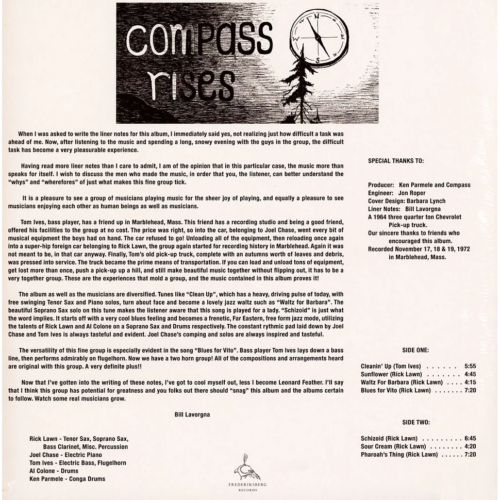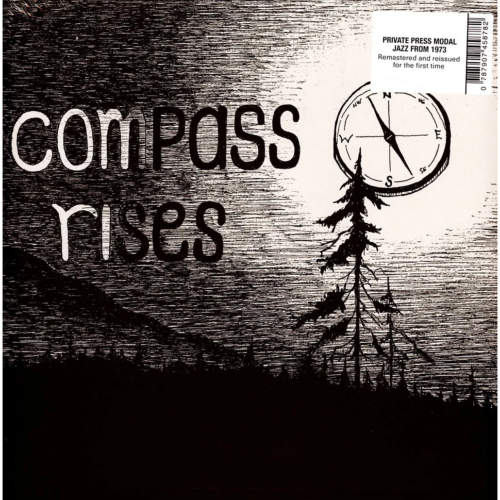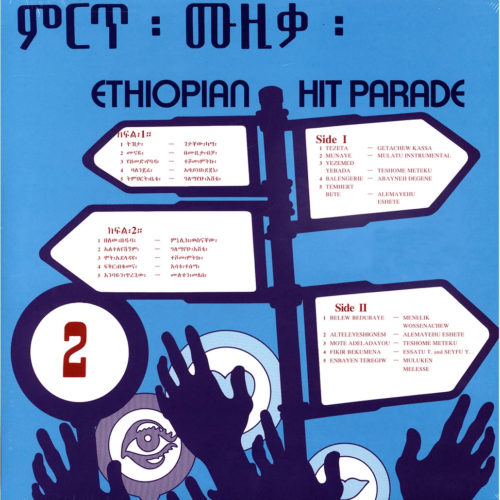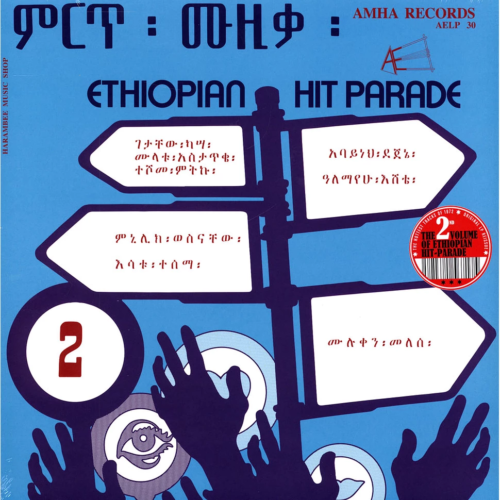-

 When arists self-releases their own recordings, they do so in the hopes that a hit might develop, or even better, a sphere of influence might form. In a lot of cases these records provide a stamp of existence and intent – a sonic business card showing what musicians were made of. Compass Rises (1973), the privately pressed sole LP by Oneonta, New York’s Compass, is both a sampling of versatility and a declaration of straight-ahead purpose. Regularly active in upstate New York between 1969 and 1974, Compass was an acoustic-electric quartet that played original music and modern jazz standards. The group consisted of saxophonist and bass clarinetist Rick Lawn, keyboardist Joel Chase, bassist Tom Ives (doubling on flugelhorn), and drummer Al Colone. On the LP, percussion duties were shared across the band as well as an conguero, Ken Parmele. Every song on Compass Rises, with the exception of the opener, is written and arranged by Lawn. The album is a nod to the post-Coltrane lineage of 1970’s jazz – even at its most spry there’s an undertow of workmanlike toughness, perhaps a reflection of the industrial-collegiate hybrid towns in New York where Compass plied their trade. Ives’ “Cleanin’ Up” starts the proceedings, a modal groover that would not have sounded out of place on a Joe Henderson Milestone LP, coupled with a neat, funky turnaround in the head. “Sunflower” has a slight Latin flavor and while it’s not exactly Freddie Hubbard’s “Little Sunflower,” it does have a lilt that’s both sinewy and breezy, with Lawn’s huskily burnished tenor shimmying atop. Following the ballad “Waltz for Barbara,” a front line expanded with Ives’ flugelhorn opens up on the driving “Blues for Vito,” dry and cracking rhythm supporting a tough, metallic dance. Side two begins with “Schizoid,” the nasally incision of Lawn’s soprano saxophone in spiraling turns against pummeling toms and Chase’s fuzzed-out intervallic sprawl. “Sour Cream” is a choppy bit of soul jazz, while the closing “Pharoah’s Thing” starts off on an elegiac plateau before unfurling with a piquant, minor-key bounce. With its stark, somewhat gothic cover art and toothy, inspired playing and composing, Compass Rises deserves the critical examination that it likely didn’t have upon release.
When arists self-releases their own recordings, they do so in the hopes that a hit might develop, or even better, a sphere of influence might form. In a lot of cases these records provide a stamp of existence and intent – a sonic business card showing what musicians were made of. Compass Rises (1973), the privately pressed sole LP by Oneonta, New York’s Compass, is both a sampling of versatility and a declaration of straight-ahead purpose. Regularly active in upstate New York between 1969 and 1974, Compass was an acoustic-electric quartet that played original music and modern jazz standards. The group consisted of saxophonist and bass clarinetist Rick Lawn, keyboardist Joel Chase, bassist Tom Ives (doubling on flugelhorn), and drummer Al Colone. On the LP, percussion duties were shared across the band as well as an conguero, Ken Parmele. Every song on Compass Rises, with the exception of the opener, is written and arranged by Lawn. The album is a nod to the post-Coltrane lineage of 1970’s jazz – even at its most spry there’s an undertow of workmanlike toughness, perhaps a reflection of the industrial-collegiate hybrid towns in New York where Compass plied their trade. Ives’ “Cleanin’ Up” starts the proceedings, a modal groover that would not have sounded out of place on a Joe Henderson Milestone LP, coupled with a neat, funky turnaround in the head. “Sunflower” has a slight Latin flavor and while it’s not exactly Freddie Hubbard’s “Little Sunflower,” it does have a lilt that’s both sinewy and breezy, with Lawn’s huskily burnished tenor shimmying atop. Following the ballad “Waltz for Barbara,” a front line expanded with Ives’ flugelhorn opens up on the driving “Blues for Vito,” dry and cracking rhythm supporting a tough, metallic dance. Side two begins with “Schizoid,” the nasally incision of Lawn’s soprano saxophone in spiraling turns against pummeling toms and Chase’s fuzzed-out intervallic sprawl. “Sour Cream” is a choppy bit of soul jazz, while the closing “Pharoah’s Thing” starts off on an elegiac plateau before unfurling with a piquant, minor-key bounce. With its stark, somewhat gothic cover art and toothy, inspired playing and composing, Compass Rises deserves the critical examination that it likely didn’t have upon release. -
Ausverkauft

 The follow up to the highly acclaimed reissue of the first volume, Ethiopian Hit Parade. The track layout is identical to the original record released in 1972. "After releasing around fifty 45 rpm singles and his first 33 rpm album (Ethiopian Modern Instrumental Hits AELP 10, re-released by Heavenly Sweetness HS092VL), Amha Esthèté set about compiling his best 45s on a series of now legendary albums (the originals are impossible to find) in 1972. The first four volumes of Ethiopian Hit Parade were released in September and October 1972, with the fifth volume appearing in January 1973. You are the proud owner of Volume 2. It is worth reminding ourselves that when Amha Esthèté set up his Amha Records label in 1968-69, it was in defiance of a state monopoly designed to regulate the imports and production of records by an imperial decree of July 1948. This extravagant state privilege had produced only 78s of traditional music , which though thrilling, excluded anything at all modern. To the best of our knowledge, only sixty-seven of these prehistoric discs were pressed in Great Britain between 1955 and 1961 and released by His Master’s Voice. They were supposed to be part of celebrations of Emperor Haile Selassie’s silver jubilee . . . even though 33s and 45s had existed since 1948 and 1949 respectively! Such incompetence and servility, combined with a rejection of an effervescent contemporary music scene, were symptomatic of the decadence surrounding the end of an era. An audacious, funky outlaw, a music lover and an entrepreneur in tune with the baby-boomer generation, young Amha Esthèté (he was only twenty-four when he launched his label) will be remembered as the instigator of a peaceful revolution thick with soul and rock’n’roll. After the acclaimed reissue of the first volume Ethiopian Hit Parade. Here is the second volume that include all the greatest Ethiopian Hits from 1972 to 1975. Identical reissue to the original vinyl which is extremely rare and expensive. The opening track of the compilation is the song Tezeta Slow and Fast by GETACHEW KASSA were featured on the album Ethiopiques, Vol. 10: Ethiopian Blues & Ballads. and originally released on 1972. The other tracks on this second volume celebrate such pioneers of modern Ethiopian groove as Abayneh Degene, Tèshomè Meteku, Menelik Wossenachew Mulatu Astatqe and Muluken Melesse, alongside “tradi-modern” singers representing Amhara and Oromo culture, so rich and so long marginalized."
The follow up to the highly acclaimed reissue of the first volume, Ethiopian Hit Parade. The track layout is identical to the original record released in 1972. "After releasing around fifty 45 rpm singles and his first 33 rpm album (Ethiopian Modern Instrumental Hits AELP 10, re-released by Heavenly Sweetness HS092VL), Amha Esthèté set about compiling his best 45s on a series of now legendary albums (the originals are impossible to find) in 1972. The first four volumes of Ethiopian Hit Parade were released in September and October 1972, with the fifth volume appearing in January 1973. You are the proud owner of Volume 2. It is worth reminding ourselves that when Amha Esthèté set up his Amha Records label in 1968-69, it was in defiance of a state monopoly designed to regulate the imports and production of records by an imperial decree of July 1948. This extravagant state privilege had produced only 78s of traditional music , which though thrilling, excluded anything at all modern. To the best of our knowledge, only sixty-seven of these prehistoric discs were pressed in Great Britain between 1955 and 1961 and released by His Master’s Voice. They were supposed to be part of celebrations of Emperor Haile Selassie’s silver jubilee . . . even though 33s and 45s had existed since 1948 and 1949 respectively! Such incompetence and servility, combined with a rejection of an effervescent contemporary music scene, were symptomatic of the decadence surrounding the end of an era. An audacious, funky outlaw, a music lover and an entrepreneur in tune with the baby-boomer generation, young Amha Esthèté (he was only twenty-four when he launched his label) will be remembered as the instigator of a peaceful revolution thick with soul and rock’n’roll. After the acclaimed reissue of the first volume Ethiopian Hit Parade. Here is the second volume that include all the greatest Ethiopian Hits from 1972 to 1975. Identical reissue to the original vinyl which is extremely rare and expensive. The opening track of the compilation is the song Tezeta Slow and Fast by GETACHEW KASSA were featured on the album Ethiopiques, Vol. 10: Ethiopian Blues & Ballads. and originally released on 1972. The other tracks on this second volume celebrate such pioneers of modern Ethiopian groove as Abayneh Degene, Tèshomè Meteku, Menelik Wossenachew Mulatu Astatqe and Muluken Melesse, alongside “tradi-modern” singers representing Amhara and Oromo culture, so rich and so long marginalized."